| Reviews & Columns |
|
Reviews DVD TV on DVD Blu-ray 4K UHD International DVDs In Theaters Reviews by Studio Video Games Features Collector Series DVDs Easter Egg Database Interviews DVD Talk Radio Feature Articles Columns Anime Talk DVD Savant Horror DVDs The M.O.D. Squad Art House HD Talk Silent DVD
|
DVD Talk Forum |
|
|
| Resources |
|
DVD Price Search Customer Service #'s RCE Info Links |
|
Columns
|
|
|
Sgt. Pepper's Lonely Hearts Club Band
As one who long ago despised "bad" music but has since learned to revel in its unintentional humor, I've found that covering (the nice term for "ripping off") the Beatles has been one of the greatest sources of entertainment to be laughed at. The Beatles of course have long been regarded as the greatest rock band of all time, and while sometimes another artist doing songs made famous by another is seen as a "tribute" one still has to wonder why anyone would want to listen to anything other than the original song from the original artist. Any time I find an album of Beatles music not performed by the Beatles themselves (the Muzak instrumental "Beatles Songbook" by the Hollyridge Strings is a personal favorite) I have to grab it and usually end up in fits of laughter. Another favorite genre of albums is what's been called "Record Rip-Offs" which were prevalent in the 1970s, where popular songs of the day were collected on albums but performed by no-name studio musicians and singers- the song titles would usually be in big letters on the album covers but you'd have to look carefully to find the small print stating that these weren't the original hit versions you knew and loved.
The Bee Gees (which stood for "Brothers Gibb," Barry, Robin and Maurice) were of course huge in the 70s, first becoming famous in the 60s for Beatle-esque pop tunes and then re-inventing themselves (and some say selling out) in the 70s by "going disco," with a number of hit songs included in 1977's Saturday Night Fever whose 2-record soundtrack became one of the biggest-selling albums of all time. Producer Robert Stigwood sought to follow that up with what he thought was sure to be the cinematic and musical event of 1978: Sgt. Pepper's Lonely Hearts Club Band, an all-star salute to the songs of the Beatles headlined by the Bee Gees and Peter Frampton. This ended up being one of that year's biggest flops, and is considered by many as one of the worst movies of all time. This of course should be enough to make you want to see it if you haven't already.
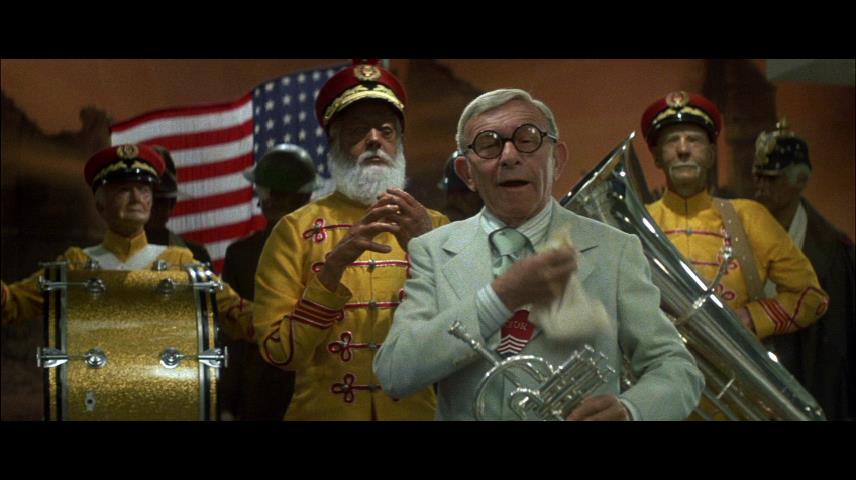
Played out as a rock opera without any spoken dialogue apart from some usually off-screen narration, Sgt Pepper attempts to make a story from elements of several Beatles songs, largely from their 1967 "Sgt. Pepper's Lonely Hearts Club Band" album as well as the later "Abbey Road." Some of the references are obvious, while others might only make sense to those who've studied the printed song lyrics. The backstory (told by the mayor of Heartland, Mr. Kite played by George Burns) is that there was an actual Sergeant Pepper during the first world war, and he formed a real Lonely Hearts Club Band which marched into battlefields and ending the skirmishes with music. After the war ended they went on to entertain the world with their music until the untimely death of the band's leader- but Pepper's grandson Billy Shears (Frampton) then formed a new Lonely Hearts Club band with his three friends the Henderson brothers (the Bee Gees) in their hometown of Heartland. Over in Hollywood, record producer B.D. (Big Deal, played by Donald Pleasance) hears of this new band and signs them to his record label where they'll be huge stars, playing more renditions of Beatles songs of course.
There's just one problem- as the band leaves Heartland for Hollywood, that makes it easy for Mean Mr. Mustard (British comedian Frankie Howerd in his only American movie appearance), a "demented ex-real estate agent" and such a mean old man, to take over Heartland. The key to this is stealing the original Lonely Hearts Club Band's instruments, which have been on display at City Hall- they have "the power to make dreams come true" but of course can also be used for evil in the wrong hands. He then turns the wholesome town into a wretched hive of scum and villainy, one of the first changes replacing the Farmers' Market with an Amusement Arcade! Billy's girlfriend Strawberry Fields (Sandy Farina) then high-tails it to Hollywood to tell the band what's going on, and they then embark on a quest to retrieve the stolen instruments in what seems almost like a video game and restore peace and wholesomeness to Heartland. All of this of course is an excuse to work in more musical numbers featuring Beatles songs with a parade of guest stars such as Steve Martin (in his first movie appearance), Earth Wind and Fire, Alice Cooper and Aerosmith.
This is the part where I say: Sound ridiculous? It is! But that's what makes this movie such a perverse thrill. Viewed cynically it looks like a big cash grab that ultimately failed, but it's also a good-natured illustration of the power of music and its ability to triumph over evil, a theme that's been explored countless times. The songs are naturally the focal point here, and while none of them can hold a candle to the Beatles' original versions a few are decent while others are laughably awful. Earth Wind and Fire (the only artists who appear as themselves, though for no apparent reason other than their being hot at the time) does a soulful version of "Got to Get You Into My Life" which was a decent hit, while Steve Martin takes on "Maxwell's Silver Hammer," a lesser-known track from the "Abbey Road" album, which is straight out of a bad 70s TV variety special. My favorite bit is a nearly 10-minute affair set to another "Abbey Road" track "I Want You (She's So Heavy)", where the band arrives in Hollywood and is picked up in BD's limo (where he proclaims his desire to sign them by saying flat-out "I want you, I want you so bad, it's driving me mad!") and ends up at a drug-fueled party that nobody remembers the next morning. A truly jaw-dropping number is George Burns singing "Fixing a Hole" with two little girls in an otherwise deserted town square joining in.
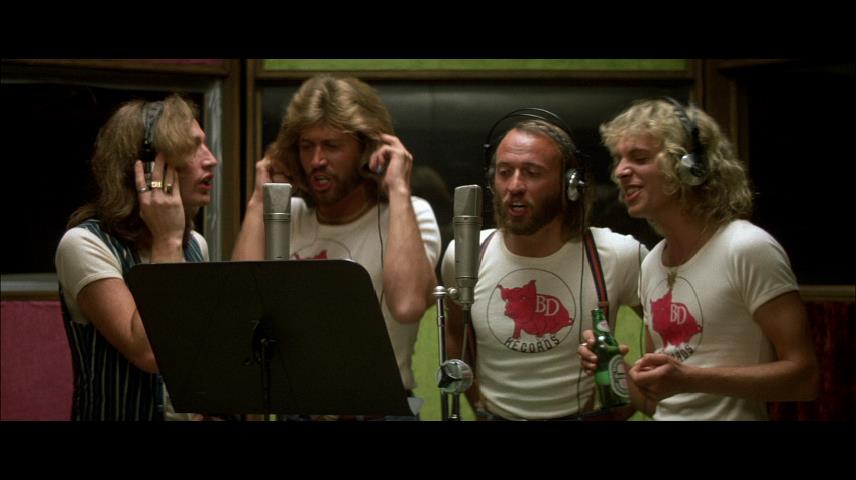
The film transfer on Shout Factory's Blu-Ray appears to be the same one used on Universal's previous DVD, but comparing the two shows an obvious improvement. The DVD looked OK when first released as it was the first time the Panavision movie was presented on a home format in its proper aspect ratio, but the Blu-Ray shows much more detail than the older format is capable of. You can actually read the words on the telegram the band receives calling them to Hollywood, and montages with magazine covers have fully readable text that was just a blur on the DVD. The transfer itself isn't spectacular but preserves the movie's intended look, with rather restrained colors and soft focus in many shots.
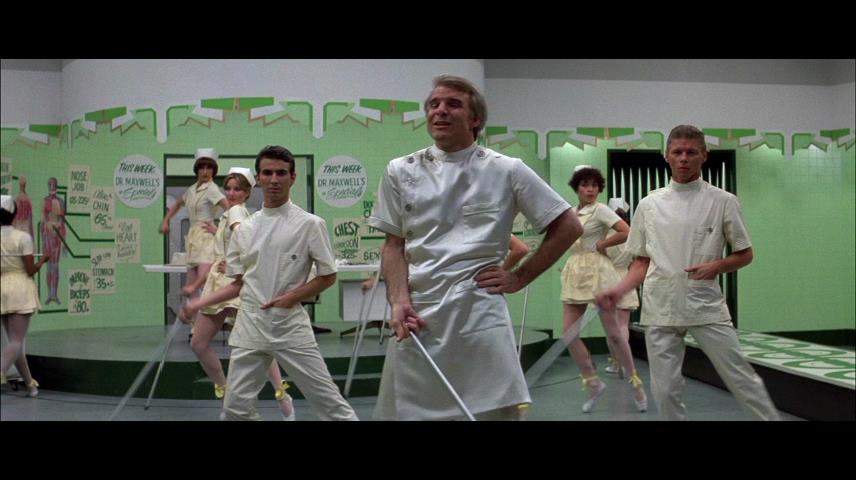
Two audio mixes are included here, both in DTS Master Audio. The first is a 2-channel track that seems to duplicate the original 35mm Dolby optical mix, sounding about the same as the audio on the original DiscoVision laserdisc release of the movie. I've always liked the older Dolby matrix tracks as they usually exploited the surround channel more; here as was typical for musicals the main effect is the drumbeats echoing in the rears just a split-second after they're heard up front. Most of the vocals are kept in the center, though a few are panned left to right depending on where they're being sung onscreen and as all three of the Brothers Gibb sing in harmony they're spread nicely across the front as they often were in their music recordings.
The second option is a 5.1 track but is actually the 4-channel magnetic sound mix used on 70mm prints. The Universal DVD had this as the only option, though it was included in both DTS and Dolby Digital. This isn't as lively as the matrixed 2-channel mix, and it most notably keeps most of the music in the left and right channels with vocals and a few instruments in the center, with mostly an echo in the surrounds that's a bit more subdued than the 2-channel track. (I played this on my system with EX decoding, also comparing it with the DVD, and in both cases this resulted in sound being heard only in the back-rear channels. I'd much prefer these mixes being encoded as 4-channel tracks rather than trying to pass them off as 5.1, though at least they didn't do any additional tinkering. There didn't seem to be any sound at all from the subwoofer.) I preferred the 2-channel mix out of the two, but your mileage may vary- in either case it's impossible to play them too loud! 70mm was of course reserved for the premium venues, with many theaters running 35mm sound in mono up through the 90s in some cases. The disc includes hearing-impaired subtitles which show all of the song lyrics; the Spanish and French subs from the DVD are missing here but as those did not translate the song lyrics it isn't a big loss.
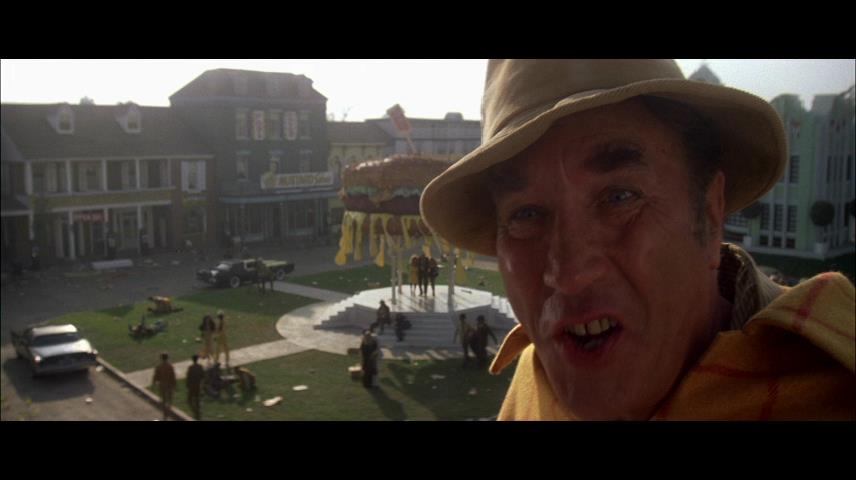
New to this Blu-Ray disc is a commentary track with "pop culture historian" and Shout Factory production associate Russell Dyball, who provides a wealth of information, introducing the movie as "both a monument to and burning effigy of the late 1970s." He's definitely done his homework, mentioning others who were considered for many of the roles here and a bit of background on the story, seemingly having started out as an off-Broadway production in 1974. Although he ends the commentary a bit before the very end, there aren't any gaps other than "a moment of silence for the late great Tower Records" when their Sunset Boulevard store appears onscreen.
There's also a short slide show of production stills that includes the invitation mailed out to celebrities to appear in the movie's grand finale, and a display of bubble gum cards (which you can currently buy sealed packs of on Ebay!) The trailer is also included but is unfortunately the same cropped 4x3 transfer found on the DVD.
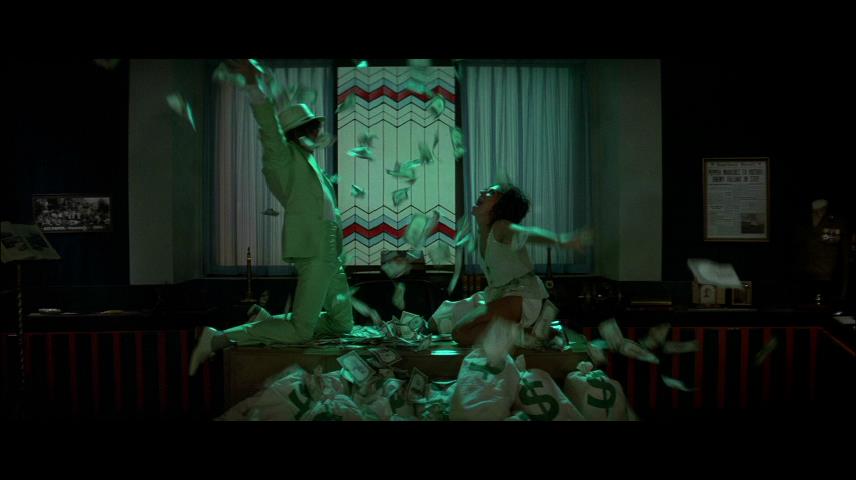
Naturally some people balked at having songs by The Beatles used the way they were here, and some still do today. While this is a "bad movie" without any doubt, its ridiculousness earns it a solid place in the so-bad-it's-good category and a space on my shelf with other over-the-top musicals like The Apple and Can't Stop the Music. It's one movie that never ceases to put a smile on my face and I usually want to start it over again once it ends. For a while I thought the old panned and scanned laserdiscs were the best this movie would ever look at home (owing to the likely costly music rights) but I've since been surprised first with Universal's DVD release and now this further upgrade on Blu-Ray.
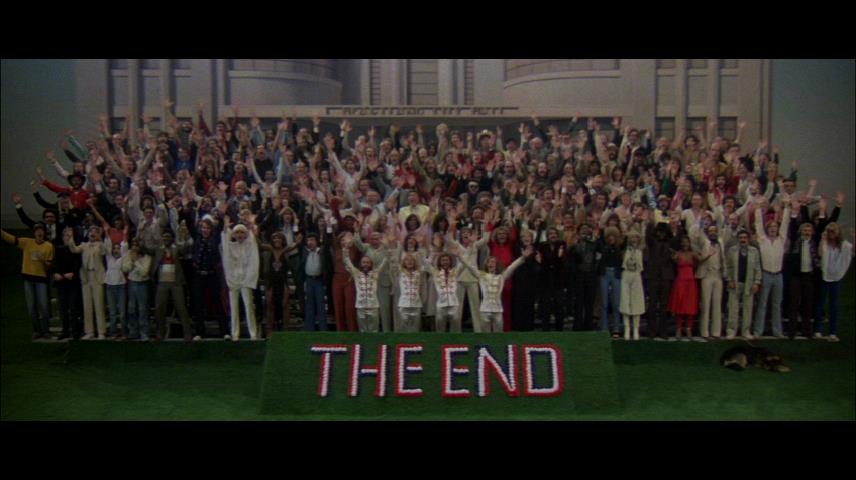
Jesse Skeen is a life-long obsessive media collector (with an unhealthy preoccupation with obsolete and failed formats) and former theater film projectionist. He enjoys watching movies and strives for presenting them perfectly, but lacks the talent to make his own.
|
| Popular Reviews |
| Sponsored Links |
|
|
| Sponsored Links |
|
|
| Release List | Reviews | Shop | Newsletter | Forum | DVD Giveaways | Blu-Ray | Advertise |
|
Copyright 2024 DVDTalk.com All Rights Reserved. Legal Info, Privacy Policy, Terms of Use,
Manage Preferences,
Your Privacy Choices | |||||||













